- Home
- Robert J. Harris
The Thirty-One Kings Page 9
The Thirty-One Kings Read online
Page 9
Wending our way past squares and parks we saw trenches that had been dug months before to provide shelter against a bombardment that now would never come. On some of the side streets dispirited civilians were pulling down barricades which had been rendered futile by the surrender of the city. I felt as if we were driving through the aftermath of a battle that had already been lost. It was such a bleak spectacle, I was glad when Dougal broke the silence inside the car.
‘Since we’re here to find this Roland character, it would help if we knew a bit more about him.’
‘Roland is a false name he uses to keep his true identity safe from the Germans,’ I said. ‘So we know very little about him.’
‘Mr Blenkiron has a hunch as to his true identity,’ Jaikie added, ‘and if he’s correct, then I was acquainted with the man at Cambridge.’
‘And that man would be . . . ?’ Dougal prompted.
Jaikie shook his head gravely. ‘I’m under orders not to speak his name. For one thing, the fewer of us who know, the more secure he is. For another, if Mr Blenkiron’s hunch is wrong, then I would be misleading Mr Hannay and the rest of you, sending you off on a false trail while time ticks away.’
His fellow Die-Hards were clearly unhappy with this secrecy, but I came to Jaikie’s defence.
‘I think you and Blenkiron have reasoned this out correctly. I have some leads of my own to follow, and you, Jaikie, must know the habits of your old college friend.’
He nodded. ‘That I do. Knowing what his passions and pastimes are, I can try to pick up his trail from that.’
‘What about the rest of us?’ enquired Dougal, not entirely pacified.
‘You’ll establish a command base for us at the Louis Quinze hotel,’ I instructed. ‘We need to be assured of supplies and transport for a speedy getaway once we’ve found Roland.’
The habitually silent Thomas spoke up. ‘And we had best try to discover what is the safest route out of the city.’
‘The Germans are closing in from all sides,’ said Peter gruffly, ‘but if there is a way out, I’d trust you to find it, Thomas.’
‘Let me off here,’ I said as we drove down the Boulevard de Clichy. ‘I have an errand to run close by.’
Dougal pulled in at the kerb. ‘Should we not go with you?’
‘A whole gang of us moving around together will be too conspicuous,’ I said. ‘You go on to the hotel and I’ll meet you there.’
Blenkiron had given me the address of a contact of his, the man who had acted as an intermediary for Mr Roland. With the city at least half deserted, I had a notion that enemy agents would be able to act with increasing impunity, and I did not want to tip my hand by having the Die-Hards in my company. Should anything happen to me, they would still be free to carry on with the mission.
Jaikie wished me luck as I climbed out and they drove off down the Rue Fontaine into town. Outside the confines of the car I became even more aware of the taut atmosphere pervading the city. In spite of the diamond bright sky and the fresh summer breeze, the air itself felt heavy with an awful oppression.
On my visits to Paris during the last war, the city had defiantly maintained its gaiety in spite of the battles raging to the north and east. The enemy had been stopped at the gates and the very survival of Paris was a cause for celebration with every new sunlit day.
Now as I walked through Montmartre, even the Sacré-Coeur, in all its lofty beauty, looked lonely and as fragile as an eggshell. The few people I passed in the street avoided my gaze and hunched their shoulders as though weighted down by the imminence of disaster. A line from The Pilgrim’s Progress ran through my mind, a passage that spoke of ‘the powers and terrors of what is yet unseen’.
I passed a closed-up butcher’s shop and a bakery that was open for business, though there were only a few loaves and some stale croissants on display. The breeze brought a scent of burning and I saw rising above the rooftops the smoke of several bonfires. I wondered if they were intended as a signal or a warning.
Then, as I rounded the corner I heard the voices of two men, their speech loud and slurred. They had a young woman pressed against a wall and were offering her a swig of wine. Each had an open bottle in his hand and more bottles protruded from their coat pockets. I had an intuition that none of these had been paid for but were looted from an abandoned shop.
When I hailed them they turned their bleary eyes upon me and I guessed that they had begun their day with a breakfast of wine and intended to continue with this diet until the invaders arrived. I saw now that the woman had a pretty, slender face, with bright coral lipstick decorating her generous mouth. Her blonde hair was fashionably done up in curls and she wore a feathered bonnet that matched the colour of her jade green jacket and skirt. She looked uneasy rather than frightened, but I still felt she was in need of assistance.
‘My friends, you should not offer wine to my sister,’ I informed them in my most affable French.
‘Your sister?’ one of them bleated in surprise.
‘Yes, I have told her so many times not to wander out by herself.’ I drew closer. ‘But will she listen? No!’
‘Your sister?’ the other drunkard repeated blankly.
‘Yes, she is forever finding ways to make trouble. Why, even a drop of wine turns her into a very she-devil. I once saw her smash a bottle across a man’s face because he spilled the merest drop of coffee onto her wrap.’
‘You need to take care of her,’ the first man advised me in an overly serious tone. They were both backing away and I saw a quirk of amusement on the young woman’s lips.
‘Ah, Joseph, you never let me have any fun,’ she pouted.
‘What you call fun, the police call criminal assault,’ I informed her severely.
I gently took her by the arm and led her away from the drunks who staggered off in the other direction, making a desultory attempt at the first bars of a popular song.
‘So you are my brother?’ she said in a friendly voice.
‘They might have felt obliged to show that they were not cowed by a husband, who would be viewed as a rival for your admiration.’ I removed my hand from her arm. ‘Most men have a sister who tries them, however, so that established a bond that removed the need for any confrontation.’
‘Thank you for your assistance,’ she said. ‘I do not think they meant any harm, but. . .’
‘If they carry on the way they are, they may cease to be amusing,’ I warned. ‘This is not a time for a young lady to be out alone.’
‘Everyone has their own way of coping with this terrible waiting,’ she said. ‘For them it is wine, for me it is this.’
She displayed a daintily wrapped box of chocolates which she held in one gloved hand. ‘My favourite confectioner is leaving Paris today and I could not face the future without one last box of his most excellent chocolates. May I offer you one?’
‘It would be a shame to spoil such beautiful wrapping,’ I declined. ‘Have you far to get home?’
‘My car is just over there,’ she said, pointing to a silver Citroën Cabriolet. ‘And I promise to go directly home, without any further need for the intervention of a bold English knight. Your accent reveals that much.’
‘My name is Cornelius Brand,’ I told her, ‘and actually I’m from South Africa.’ I had instinctively slipped into a false identity, even in the presence of this harmless girl, for I knew I was now on dangerous ground. Even all these years after the last war, the name of Richard Hannay might still set off an alarm in the wrong quarters.
‘Really, Mr Brand? You have come a very long way to get caught up in someone else’s war.’
‘I’m only here on business. I don’t intend to do any fighting.’
‘Well, you have won your first minor skirmish,’ she said, crossing the road to her car. ‘Enjoy your time in Paris, Mr Brand, while it is still possible to do so.’
As she drove off I had the sense that there was something familiar about her. I reckoned that she was typical of a c
ertain sort of Parisian woman, a sort I had met years before, who cared nothing about the rise or fall of the Republic, but would risk everything for the sake of a trivial luxury.
I proceeded to the address Blenkiron had given me in the Rue Dancourt. The street appeared deserted with most of the businesses shuttered. From an open window in an upstairs apartment came the sound of a phonograph playing one of Puccini’s arias. Other than that and a few distant car engines, all was quiet.
The sign over the shop read Ambroise Pellerin, Opticien-Lunetier. The window shutters were down and I felt my hopes sink at the realisation that my contact may already have fled the city, leaving me with no thread to follow. However, when I tried the door it opened easily and a small bell rang as I entered.
The interior was shrouded in gloom but there was something in the air that put me on alert. This immediate intimation of danger kept me from calling out to the proprietor. Instead I silently drew my pistol and advanced cautiously into the shadows. A small light showed through a bead curtain at the back of the shop. When I reached it I stood to one side with a display of spectacle frames at my back. I reached out one hand and slowly opened a gap in the beads.
When there was no reaction I swiftly moved out of hiding and into the room at the rear. A small overhead light illuminated a series of wall charts and a variety of lenses and other paraphernalia of the optician’s trade. At the far end of the room was a low desk which I approached cautiously before peering over the top to the floor behind.
Now I knew what had alerted me to the possibility of danger: it was the scent of death. The body was that of a small, bald-headed man in a grey suit. He lay curled up on the floor behind the desk, and from his pallid flesh and the coagulation of the blood I calculated that he must have been here since the day before. The crushed condition of the skull left me in no doubt he had died instantly from one terrible blow. What was left of his features matched the face in a photograph on the wall, which showed him standing proudly before his newly opened establishment in a much happier time. There was no sign of the murder weapon nor any indication that the place had been ransacked for money.
I had already seen evidence that looting was taking place, but surely it was too much of a coincidence that this man had been killed because he walked in on some would-be thief. No, I was quite certain that it was his connection to Blenkiron and the British intelligence service that had signed his death warrant. With the impending arrival of the Wehrmacht, the enemy had grown bold indeed to commit cold-blooded murder here in Paris.
I quickly checked all the doors and cupboards, mainly out of habit, for the assailant was surely long gone. I slid my pistol back into its holster and wondered what to do. In normal times I would report this discovery to the police, but the times were scarcely normal. On the other hand, the Prefecture might be my most logical port of call.
Once outside I walked for a considerable distance before I caught sight of a taxi cruising slowly in search of a customer. I hailed the vehicle and jumped in the back as soon as it stopped, urging the driver to be off with some haste. It was possible the optician’s shop was being watched and that I had been tailed.
I had the driver take us randomly around the city and engaged him in conversation so he would not give too much thought as to why I was doing it.
‘Business is very slow, it seems.’
‘It is almost dead. First, all the rich people left, and now most of the poor have gone too. You are only my second customer today. The first was hauling a large suitcase and wearing three layers of clothes. He asked me to take him to Marseilles. I explained that would make me late for my supper and sent him to find alternate transport.’
‘You’re not interested in running away?’
The driver shrugged. ‘Where to? I know every street, alley and shortcut in Paris. It would take me years to get to know another city so well. So I stay here. The Germans will use taxis when they get here and there will be many of them. When the Germans leave, everyone else will come back and life will go on.’
‘You think the Germans will leave then?’ I asked.
‘Of course. They will steal what they can and go home. Why would they want the headache of trying to run a city as insane as Paris. Me, I like the insanity. But I would not want to be in charge of it,’ he added phlegmatically. ‘Now, if we have driven around enough to shake off whatever angry husband is pursuing you, where do you want to go?’
‘To the Prefecture of Police.’
He nodded. ‘You might as well,’ he said. ‘Go and confess now to whatever crimes you have committed. By morning they will be bagatelles compared to what is coming.’
13
THE LAST GUARDIANS
We crossed the Pont Notre-Dame to the Îie de la Cité and here the driver let me out in the main square in front of the Prefecture of Police. I gave him a large enough tip to put a smile on his face even in this troubled time. As he drove off I hoped it would be of some small help to him through what lay ahead. I gazed across the square at the face of the great Gothic cathedral of Notre-Dame de Paris, with its double doors, its solid, soaring towers and its array of threatening gargoyles perched along the roof. A flight of doves glided between the towers then arced upwards into the sky where I lost them against the brightness of the sun.
For a moment the cathedral took on in my eyes the appearance of a massive rock rising out of a stormy sea, unmoved and unmarked by the crashing waves of war and revolution. Somehow, through all the turmoil, civilisation survived and men learned again to live in peace, turning their energies to better things than killing each other by the thousand.
The thought came to me that, down the centuries, hundreds of others had stood on this spot before me, gazing at the mighty facade, and felt the same realisation wash over them. In ages to come others would stand here again and see eternity itself raised up before them in the ancient stonework.
On a normal day there would be swarms of sightseers here, but today only a few cyclists rolled past the worshippers who were filing despondently into the cathedral. From inside I could hear the faint murmur of Mass and wondered if, against all hope, the faithful were still praying for peace.
I turned away from the mercy of God towards the justice of man. The grey walls of the Prefecture loomed over me, their many windows staring out across the city like the empty eyes of a blind man. Passing through the arched entrance, I sought out the reception area.
It was unexpectedly quiet inside and only a single junior officer sat at the desk. I gave him my name and showed my identification, then asked to be shown to whoever was in charge. Silently I wondered if there was any such person in what was becoming a city of ghosts. He rose and straightened his tunic, then led me up a flight of echoing stairs to the next floor. Ushering me into the Prefect’s office, he announced me to his superior and left.
There were two men here: one a short fellow in a smart police uniform, the other a burly civilian smoking a pipe. ‘I am the Prefect of Police, Paul Rogeron,’ said the officer. He cut a dapper figure in his immaculate blue uniform, the buttons freshly polished as if he expected to review a parade before the day was out. ‘In these dangerous times I must ask for some confirmation of your identity.’
As the prefect examined my papers I cast an eye around the room. A large map of the city was flanked by various certificates charting the prefect’s ascent up the ranks to his present lofty position. On his desk a photograph of a pretty woman and three children presented an island of domestic simplicity amid a sea of folders and documents.
Rogeron presented my identification to the other man who waved it away and offered me his hand.
‘Glad to meet you, Mr Hannay. I’m William Bullitt, the American ambassador.’
He grinned as we shook hands. He was a broadshouldered man in a rumpled white suit, whose loosened tie and tousled hair suggested that he had spent the past twenty-four hours hard at work. He was smoking a briarwood pipe filled with tarry tobacco. I had the impression that thi
s was his primary source of fuel rather than the coffee and pastries laid out on the desk.
‘Mr Bullitt and I comprise what must pass as the government of Paris,’ said Rogeron. ‘Since our elected officials fled we are left with all their responsibilities.’
‘You can think of us as two bewildered mayors,’ joked Bullitt. ‘Though pretty soon I expect those duties will be taken out of our hands.’
‘So many requests,’ the prefect sighed, shuffling the documents on his desk, ‘so many questions. Should our flags be displayed defiantly or flown at half mast or removed completely? Should the gendarmerie continue in their duties tomorrow or hand all authority over to the occupying force? Should munitions and other supplies be destroyed or left as plunder for the enemy?’
Bullitt thrust a hand into his pocket and jingled some coins. ‘I’m still trying to figure out which foreign nationals will be safe here once the Germans move in. For a while the city was crowded with Czechs, Poles, Austrians, Norwegians and so on, but now the population’s dropped to a fraction of what it was.’
‘Those who are left still require guidance and security,’ said Rogeron.
‘But those are our troubles, Mr Hannay,’ said Bullitt ruefully. ‘What brings you here? I don’t imagine you’re looking for a night out at the Moulin Rouge.’
‘I’m here because of a countryman of yours, Mr Bullitt,’ I told him, ‘John S. Blenkiron.’
‘Johnny!’ the American exclaimed with a laugh. ‘I thought that old bandit had gone to ground. Where’s he hanging his hat these days?’
‘In all sorts of places, though it was in London I met with him.’
Time was pressing too hard on us for any sort of evasion, so I explained my mission to them as briefly as I could and recounted my discovery of Pellerin’s body.
‘You’re sure it wasn’t just some opportunist robber who killed that guy?’ said Bullitt, pausing to refill his pipe.
‘Very sure,’ I replied. ‘If we can track down his killer, that could put me on the trail of Roland and his captors.’

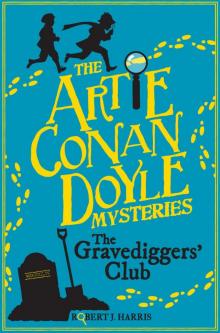 Artie Conan Doyle and the Gravediggers' Club
Artie Conan Doyle and the Gravediggers' Club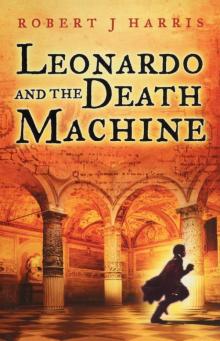 Leonardo and the Death Machine
Leonardo and the Death Machine Jason and the Gorgon's Blood
Jason and the Gorgon's Blood Will Shakespeare and the Pirate's Fire
Will Shakespeare and the Pirate's Fire Odysseus in the Serpent Maze
Odysseus in the Serpent Maze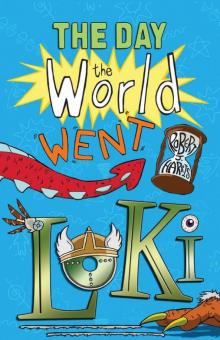 The Day the World Went Loki
The Day the World Went Loki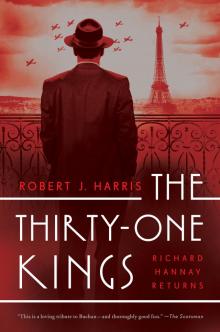 The Thirty-One Kings
The Thirty-One Kings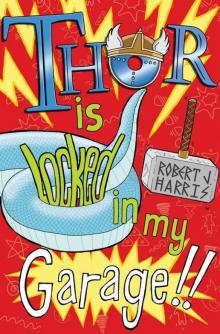 Thor Is Locked in My Garage!
Thor Is Locked in My Garage! Odin Blew Up My TV!
Odin Blew Up My TV!